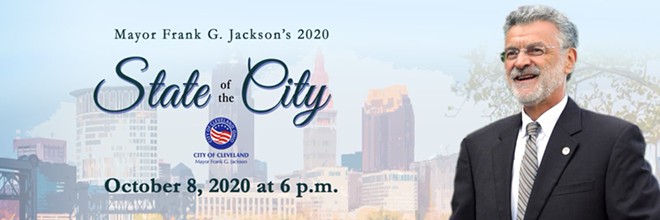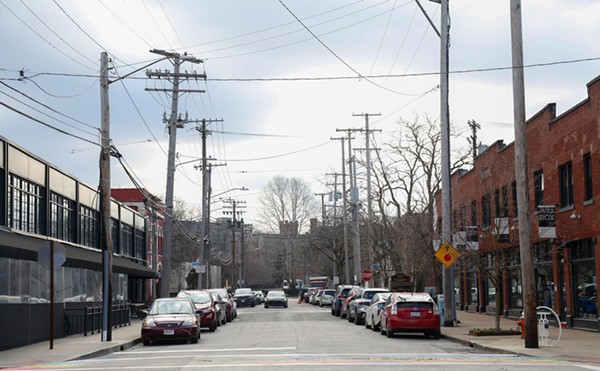Mayor Jackson, Master Diagnostician, Identifies One Thing Keeping Cleveland from Becoming "Great City"
By Sam Allard on Fri, Oct 9, 2020 at 12:27 am
[
{
"name": "Ad - NativeInline - Injected",
"component": "38482495",
"insertPoint": "3",
"requiredCountToDisplay": "5"
},{
"name": "Real 1 Player (r2) - Inline",
"component": "38482494",
"insertPoint": "2/3",
"requiredCountToDisplay": "9"
}
]
Cleveland will never be a great city, Mayor Frank Jackson declared in his 15th State of the City address Thursday evening, unless big institutional changes are made to combat systemic inequities.
Jackson used the bulk of his annual speech, delivered from his expansive, crimson-carpeted office at City Hall and streamed live on social media, to recapitulate the ways Cleveland has dealt with what he called the two defining events of 2020: the coronavirus pandemic and social unrest. In doing so, he cited far more numbers than he has in years past, rattling off investments, capital projects and monthly budget shortfalls as if reading directly from a ledger. (Much of this material has been previously reported.)
But he reserved his finale for a call to action, directed, it would seem, to the denizens of Cleveland's C-suites, whom he regards as the real leaders and change-agents in town.
"Just words, just the identification of the problem or even the promise of something better will not be enough to forestall this disaster [of increased social unrest]," he said, approaching the rhetorical climax of his 40-minute address. "Don't be tempted, because of the momentary calmness, to take the path of incremental changes and the attitude that this is just too much for us to handle all at once. This is the moment that will define us. The Cleveland community has the ability to make institutional changes. And it has the means to eliminate inequities, disparities and racism. The only question is, do we have the will and the courage to make Cleveland a great city?"
Having delivered a version of this address 14 times before, Jackson is understandably hard up for original content. And alert listeners might have recognized the "great city" bit. In years past, according to Jackson, Cleveland could become a great city only if it provided for "the least of us." In 2016, Cleveland could become a great city only if voters passed an income tax hike. In 2017, Cleveland could become a great city only if voters re-elected Frank Jackson himself, so that he might implement, at last, the various plans for which his first three terms were required to lay the groundwork. Indeed, every year, the Mayor manages to pinpoint one key obstacle keeping Cleveland's greatness just out of reach.
In prior addresses, this annual diagnosis sometimes doubled as an indictment of his own leadership. If, after more than a decade in the Mayor's chair, for example, the "least of us" still weren't being provided for — and as a matter of fact were becoming "most of us" — then Jackson was failing on his own terms.
The same is true this year, although even more explicitly. After all, having the ability to make institutional changes, but neither the will nor the courage to do so, is a pretty good summation of Jackson's latter terms in office. In June, during his infamous "butthole of the world" interview with The Appeal's Matthew Ferner, he came out and said as much. He articulated a view of paralyzed leadership in which big institutional changes are simply not on the table in Cleveland, unless they are proactively pursued (i.e., funded) by the corporate community.
That's how we know where Thursday's grand appeal was directed.
But the inequities he stressed — those inherent in the criminal justice system and in healthcare — can't always be solved by philanthropic dollars and corporate contributions, which I guess we're meant to assume there'll be much more of when we all have sufficient "will and courage."
One thing Jackson could have done to hit two birds with one stone regarding criminal justice and healthcare inequities was to redirect a small percentage of the Cleveland police budget to the department of public health, which happens to be in absolute shambles and will soon be without a single staff epidemiologist during a pandemic. But he has refused, generally citing the importance of the Consent Decree to maintain, and expand, police funding.
Jackson also suggested that the institutional changes he envisions will only be possible if those affected by systemic inequities actively participate in solutions. "The willingness of those who bear the burden of inequities to become police officers will go a long way," he said. Similarly, those who bear the burden of health disparities should become doctors to better serve and reflect their own communities.
What? How on earth is that a systemic change?
Jackson's recitation of ongoing real estate development projects sure struck a discordant note this year, as Cleveland has overtaken Detroit as the most impoverished city in the nation. Who cares about the Sherwin-Williams headquarters when half the kids in town are hungry?
Likewise, the devotion to the Consent Decree as a "blueprint" for systemic change made one suspicious of the Mayor's definitions, especially on the heels of May 30, when officers fired teargas, flash grenades and rubber and wooden bullets into a largely peaceful crowd; not to mention the fact that Jackson has long stood by recently retired safety director Michael McGrath, who for years was ignoring the prescribed discipline in the Consent Decree. (So much for accountability.) Within that rotten framework, a few more Black cops sure sounds like one of Jackson's incremental changes.
At multiple points in his speech, Jackson clearly stated the causes and effects of social decay. Crime, he noted, was merely a symptom of underlying institutional inequities. The oppression of Black people has been a feature of American life since the founding of the country. The political power of the marginalized has always been suppressed. This results in elected leaders who don't reflect the needs of the community. And the public's inability to have a say in how they're governed "sows the seeds of unrest."
That's all spot on! But Jackson just can't recognize that he and the trickle-down policies he has overseen are prime examples of that which he warns against.
***
Sign up for Scene's weekly newsletters to get the latest on Cleveland news, things to do and places to eat delivered right to your inbox.
Jackson used the bulk of his annual speech, delivered from his expansive, crimson-carpeted office at City Hall and streamed live on social media, to recapitulate the ways Cleveland has dealt with what he called the two defining events of 2020: the coronavirus pandemic and social unrest. In doing so, he cited far more numbers than he has in years past, rattling off investments, capital projects and monthly budget shortfalls as if reading directly from a ledger. (Much of this material has been previously reported.)
But he reserved his finale for a call to action, directed, it would seem, to the denizens of Cleveland's C-suites, whom he regards as the real leaders and change-agents in town.
"Just words, just the identification of the problem or even the promise of something better will not be enough to forestall this disaster [of increased social unrest]," he said, approaching the rhetorical climax of his 40-minute address. "Don't be tempted, because of the momentary calmness, to take the path of incremental changes and the attitude that this is just too much for us to handle all at once. This is the moment that will define us. The Cleveland community has the ability to make institutional changes. And it has the means to eliminate inequities, disparities and racism. The only question is, do we have the will and the courage to make Cleveland a great city?"
Having delivered a version of this address 14 times before, Jackson is understandably hard up for original content. And alert listeners might have recognized the "great city" bit. In years past, according to Jackson, Cleveland could become a great city only if it provided for "the least of us." In 2016, Cleveland could become a great city only if voters passed an income tax hike. In 2017, Cleveland could become a great city only if voters re-elected Frank Jackson himself, so that he might implement, at last, the various plans for which his first three terms were required to lay the groundwork. Indeed, every year, the Mayor manages to pinpoint one key obstacle keeping Cleveland's greatness just out of reach.
In prior addresses, this annual diagnosis sometimes doubled as an indictment of his own leadership. If, after more than a decade in the Mayor's chair, for example, the "least of us" still weren't being provided for — and as a matter of fact were becoming "most of us" — then Jackson was failing on his own terms.
The same is true this year, although even more explicitly. After all, having the ability to make institutional changes, but neither the will nor the courage to do so, is a pretty good summation of Jackson's latter terms in office. In June, during his infamous "butthole of the world" interview with The Appeal's Matthew Ferner, he came out and said as much. He articulated a view of paralyzed leadership in which big institutional changes are simply not on the table in Cleveland, unless they are proactively pursued (i.e., funded) by the corporate community.
That's how we know where Thursday's grand appeal was directed.
But the inequities he stressed — those inherent in the criminal justice system and in healthcare — can't always be solved by philanthropic dollars and corporate contributions, which I guess we're meant to assume there'll be much more of when we all have sufficient "will and courage."
One thing Jackson could have done to hit two birds with one stone regarding criminal justice and healthcare inequities was to redirect a small percentage of the Cleveland police budget to the department of public health, which happens to be in absolute shambles and will soon be without a single staff epidemiologist during a pandemic. But he has refused, generally citing the importance of the Consent Decree to maintain, and expand, police funding.
Jackson also suggested that the institutional changes he envisions will only be possible if those affected by systemic inequities actively participate in solutions. "The willingness of those who bear the burden of inequities to become police officers will go a long way," he said. Similarly, those who bear the burden of health disparities should become doctors to better serve and reflect their own communities.
What? How on earth is that a systemic change?
Jackson's recitation of ongoing real estate development projects sure struck a discordant note this year, as Cleveland has overtaken Detroit as the most impoverished city in the nation. Who cares about the Sherwin-Williams headquarters when half the kids in town are hungry?
Likewise, the devotion to the Consent Decree as a "blueprint" for systemic change made one suspicious of the Mayor's definitions, especially on the heels of May 30, when officers fired teargas, flash grenades and rubber and wooden bullets into a largely peaceful crowd; not to mention the fact that Jackson has long stood by recently retired safety director Michael McGrath, who for years was ignoring the prescribed discipline in the Consent Decree. (So much for accountability.) Within that rotten framework, a few more Black cops sure sounds like one of Jackson's incremental changes.
At multiple points in his speech, Jackson clearly stated the causes and effects of social decay. Crime, he noted, was merely a symptom of underlying institutional inequities. The oppression of Black people has been a feature of American life since the founding of the country. The political power of the marginalized has always been suppressed. This results in elected leaders who don't reflect the needs of the community. And the public's inability to have a say in how they're governed "sows the seeds of unrest."
That's all spot on! But Jackson just can't recognize that he and the trickle-down policies he has overseen are prime examples of that which he warns against.
***
Sign up for Scene's weekly newsletters to get the latest on Cleveland news, things to do and places to eat delivered right to your inbox.
SCENE Supporters make it possible to tell the Cleveland stories you won’t find elsewhere.
Become a supporter today.
About The Author
Sam Allard
Sam Allard is the Senior Writer at Scene, in which capacity he covers politics and power and writes about movies when time permits. He's a graduate of the Medill School of Journalism at Northwestern University and the NEOMFA at Cleveland State. Prior to joining Scene, he was encamped in Sarajevo, Bosnia, on an...
Scroll to read more Cleveland News articles
Newsletters
Join Cleveland Scene Newsletters
Subscribe now to get the latest news delivered right to your inbox.















